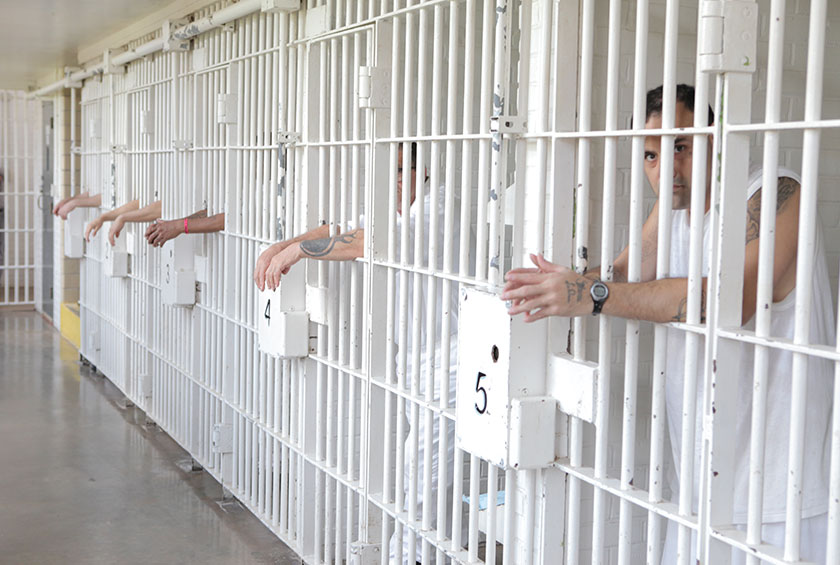The recently passed Coronavirus Aid, Relief, and Economic Security Act touches nearly every part of American society.

Spurred on by mounting healthcare costs and a flagging economy, Congress displayed unusual bipartisanship and speed in the recent passage of the Coronavirus Aid, Relief, and Economic Security (CARES) Act.
With a final price tag of at least $2.2 trillion, this "Phase 3" of coronavirus relief provides support to nearly every part of American society.
But what about the 2.2 million incarcerated Americans and the corrections staff responsible for their well-being?
UNIQUE CHALLENGES AND SOLUTIONS
During CARES Act negotiations, Prison Fellowship and our partners urged Congress to remember the coronavirus' unique threat to incarcerated men and women. As our President and CEO James J. Ackerman outlined in a recent letter, "Prison and jail environments are often difficult to keep sanitary, face constant entry and exit of staff and incarcerated individuals, and have limited resources for preventative measures and health care."
The CARES Act features important new measures, including $100 million of emergency funding for the federal prison system's COVID-19 response. The legislation also requires the Bureau of Prisons (BOP) to offer free access to phone and videoconferencing calls during the pandemic. Since facility rules limit in-person programming and visits, increasing communications ensure federal prisoners receive encouragement, accountability, and guidance during the crisis.
The U.S. Department of Justice can also expand the BOP's home confinement program under a CARES Act provision. Prompt enlargement of this mechanism will be critical for facilities to reduce crowding and maintain proper social distancing and sanitation. Additionally, the provision ensures more individuals—particularly those who are elderly or otherwise more susceptible to COVID-19—complete their punishment in settings more conducive to their health and safety.
THE CARES ACT
- $100 million emergency funding available for federal prisons to fight COVID-19.
- BOP required to offer free access to phone and videoconferencing calls.
- BOP to expand home confinement program.
The BOP has already made use of this mechanism. The use of home confinement is up 40% since March. Acknowledging in a recent memorandum that "time is of the essence," Attorney General Bill Barr directed BOP leadership to "immediately maximize transfers for home confinement" for particularly vulnerable prisoners at facilities now facing acute COVID-19 outbreaks. Read Prison Fellowship's response.
BENEFITS OF THE NEW CARES ACT
State and local justice systems will benefit from the legislation. Law enforcement, departments of corrections, and criminal justice agencies can receive aid for their coronavirus-response efforts through $850 million in emergency funding. Additionally, states and larger cities may use federal Coronavirus Relief Funds to meet costs resulting from COVID-19, including in their corrections systems.
This funding would ideally lead to more personal protective equipment, improved sanitation, and expanded health care in prisons and jails. And as more jurisdictions responsibly reduce correctional populations, these resources must assist communities implementing smart alternatives to incarceration.
Finally, CARES Act provisions will help formerly incarcerated individuals weather COVID-19's economic storm. Increased funding for affordable housing, unemployment insurance, and nutrition assistance—alongside direct "recovery checks" of $1,200 for most Americans—can help returning citizens cover a missed rent payment or make ends' meet when suffering a job furlough or pay cut.
KEEP MOVING FORWARD
Prison Fellowship is encouraged that the CARES Act takes into account the exceptional needs of currently and formerly incarcerated individuals. But we cannot end there.
We call on the president to expedite clemency decisions. And we call on Congress to take additional action to fund corrections and reentry providers. Additionally, lawmakers should encourage federal prisons to find creative ways to safely continue rehabilitative programming and religious worship. For example, Prison Fellowship is already working with some state prisons to provide our programming via Zoom video calls.
With an economic downturn likely ahead, state and local governments will see a swift loss of tax revenue for key services. As we face looming fiscal choices, it is vital to remember the innate dignity of incarcerated people and their need for sufficient health care, rehabilitative programing, and reentry support.
Most political observers expect further coronavirus relief packages after the CARES Act. These negotiations will present another critical opening for Congress to fight the spread of COVID-19 behind bars. As negotiations continue, we will do our part to ensure incarcerated men and women are not being overlooked.
GET INVOLVED
Help ensure prisoners' needs are being met during the COVID-19 pandemic. Use our advocacy tool to ask your representatives to provide hope and safety to incarcerated men and women, workers in correctional environments, and returning citizens.
DID YOU ENJOY THIS ARTICLE?
Make sure you don' t miss out on any of our helpful articles and incredible transformation stories! Sign up to receive our weekly newsletter, and you' ll get great content delivered directly to your inbox.
Your privacy is safe with us. We will never sell, trade, or share your personal information.